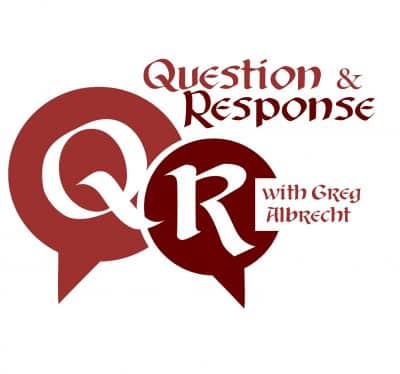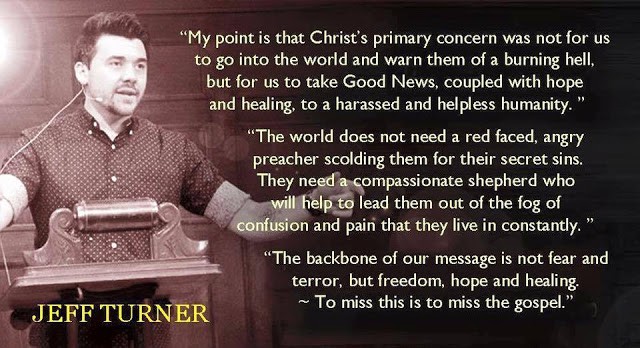Q: How Do We Avoid Cherry-Picking the Bible for a God of Love of Our Own Wishes ? – Brad Jersak
QUESTION: How do you respond to people who object that we are imposing our own ideology of peace onto the Bible rather than letting the Bible speak for itself? When you “unwrath God,” aren’t you cherry-picking according to our own wishes for what you wish the text had said rather than submitting to what it actually says?
RESPONSE: I hear this objection regularly, perhaps even weekly. I need to respond often enough that a standard answer has begun to unfold.
1. First, we must acknowledge the real problem of bias when coming to the text. We must admit the importance of being mindful as to how our prejudices impact our reading and interpretation of the Scriptures. Wearing cultural or personal lenses is normal and unavoidable. In fact, the great danger is in failing to see how personal backstories and temperaments impact everyone’s reading of the text. To believe that we can set aside all bias and have a purely objective experience of the Bible is a delusion. Indeed, imagining we can be so objective IS a highly subjective position of the modernist Evangelicalism in which I was trained. So, the first order of business is to embrace this objection as a real possibility and do our very best to analyze what filters our eyes, ears and mind are creating.
2. Second, in my case, I insist that my bias is not towards peacemaking but to violence. I don’t naturally come to the text hoping for the peaceful, non-wrathful God who sets forgiveness at the center of the gospel. I have a history of violence, violent fantasies and the desire for a violent God. This begins when I think historically and globally about tyrants such as Nero, Hitler, Stalin or Mao. My great desire is that God would reveal himself as wrathful towards such men before they slaughtered of millions upon millions of people. I object to God’s reluctance to do so. The fact that “they’ll get theirs” in the next life is of no help to those interred in death camps or to the survivors of history’s holocausts. If God is as wrathful as the opponents of peace theology believe, then that God is utterly impotent and indiscriminate in his wrath. With David, my heart cries out, “Then why do the wicked prosper?”
The objection only gets stronger as it becomes more personal and closer to home. My wife and I have prayed for countless victims of sexual assault and/or childhood molestation. They always ask, “Where was God when I cried out to him then?” Whatever answer God reveals in that vulnerable moment, we know this: he was not there striking down the wicked to prevent the abuse. In MOST cases, the offenders have never experienced justice in this world, either by the wrath of human courts or by the violence of God. This angers me. I want God to commence with his wrath and if he won’t, I would and have volunteered to be his agent. As if I would get off Scot free!? Lord, have mercy!
And this is precisely where the gospel of Jesus Christ, the Prince of Peace and nonviolent Lamb, confronts me. Rather than affirming what I hope the Bible would say, it brings me to the heart of the gospel and sternly summons me to repentance and conversion, revealing my spiritual peril whenever I nurture and yes, take pleasure in the violence of my heart. As a childhood victim of bullying, my propensity is to look for a God who will satisfy my wrath against my enemies. Thus, the sermon on the Mount is of very little comfort to those egoistic desires.
So, if I wish to impose some worldly ideology or fleshly ideology onto the text, it is not toward peacemaking, but toward wrath. I’m a violent S.O.B. When I come to the Cross, this is precisely what needs to be crucified in me. This is what, “Take up your cross and follow me” demands of me. Whatever gentleness or kindness has emerged in my life is either the fruit of weakness and defeat before injustice or it’s the transforming grace of the gospel, and maybe both. In either case, I know didn’t generate it.
3. The solution to cherry-picking is the anchor of the Cross. Returning to the question of unavoidable personal bias, we overcome these only by adopting a Christ-centered template for interpretation. We note our own temperament and wishes, but then return to the Incarnation of Jesus Christ for the definitive exegesis of God’s true nature of Triune Love. Christ becomes the gospel becomes our canon and hermeneutic through his life, teachings and most especially his death and resurrection. The apex of the Gospels comes at the cross–that cruciform revelation becomes the corrective and clarifying lens for our skewed vision, not only for the whole of Scripture but even when reading Christ’s own teachings.
I mention the latter because even some of Jesus’ parables and predictions appear to be quite violent. In his parables, God (is it God?) is sometimes depicted as the master or king who comes in wrath. But the final word from Christ–the Living Word who IS what God says of himself–reveals the punchline to all these parables on the Cross. We see God in the flesh crucified. We see him renouncing the way of wrath as a solution to evil and living his message of enemy-love. He does not smite his enemies or visit them with retribution but treads the last mile to Golgotha as the Lamb to be slaughtered. He not only dies without retaliating but completely pardons the sins of those who connived to murder him–as they do it! The Cross then becomes our clearest vision of the very nature of God. The Cross reveals that God unwrathed–nonviolent, self-giving, radically forgiving, co-suffering love. And this–impossibly, amazingly–is how he overcomes evil with good. God in Christ draws all the evil, all the sin, all the violence and the resulting suffering into himself. And the Light of his love overcomes the darkness so that from that moment, “It is finished” also means “It begins!” What begins? “Behold, I am making all things new!”
P.S. A Humbling Summons to Repent. To these three lines of response, I will add an addendum. To those who cannot track with me through to the gospel of peace, but insist that Christ’s teaching and example for nonviolence are naïve and unpractical for today, I may return to the question of bias and ask,
“What is it in your temperament or backstory or culture that needs to read retribution back into Scripture after Christ expunged it? Whatever that might be, whatever desire for violent wrath you might be imposing on God, I would call you to repentance.”
On this, I don’t speak from the lofty place of arrival, but as a sinner dependent on daily mercy to be cleansed of vengeance. If I give this kind of pushback, it may be because I’m getting impatient and grumpy. And it can sound arrogant if I communicate a sense of awakening or epiphany that critics have failed to achieve. It sounds condescending to say that we must patiently wait for them to grow up. That’s a real risk, and itself can be a manifestation of ungodly zeal.
That said, the truth is that the way of peace IS known by revelation. Christ says that “the pure in heart see God” and as a result, become “blessed peacemakers” who walk as children in the footprints of Papa. That revelation rarely happens in a magical Damascus Road ecstasy. Normally, the Way to repentance is paved by means of an encounter with the uncomfortable gospel of forgiveness and the testimony of those who have repented (Rev. 12:11). The question then is whether (a) remaining patient and silent or (b) giving voice and issuing an invitation does more harm or good in a particular situation. Will speaking up sabotage someone’s journey through my own misplaced zeal? Or will remaining silent consign them to bumbling forward on the broad way of violent gods that lead to destruction?
This calls for Grace and the Holy Spirit. And so we pray, “Lord have mercy,” because, thank God, he is.














 Plain Truth Ministries | Box 300 | Pasadena, CA 91129-0300
Plain Truth Ministries | Box 300 | Pasadena, CA 91129-0300

